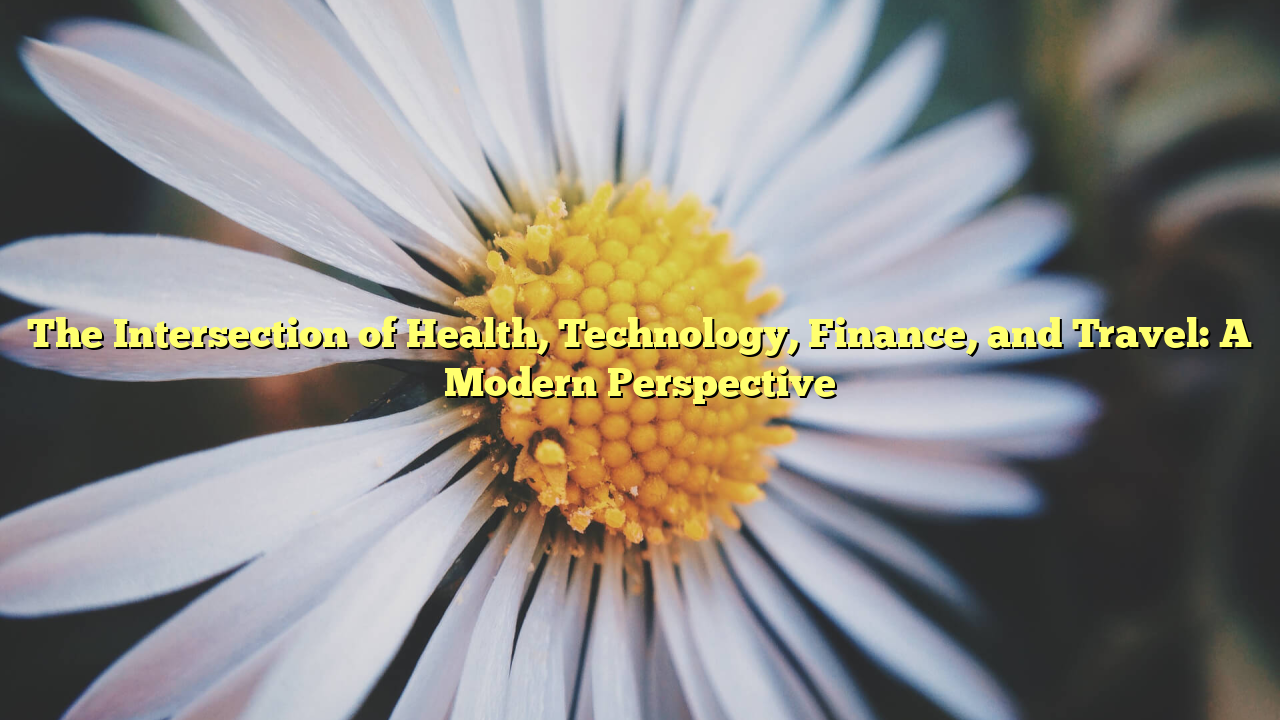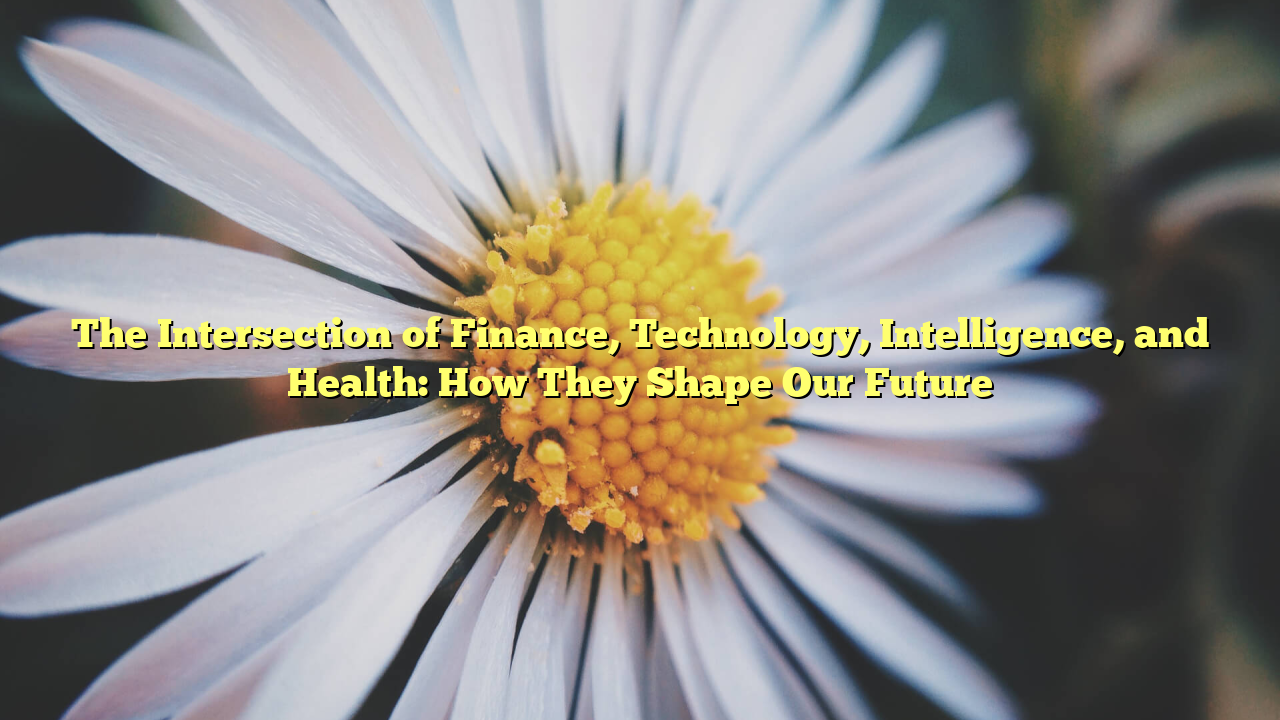In today’s fast-paced world, the integration of technology into various sectors has had profound impacts. Among these sectors, health, technology, finance, and travel stand out as industries that are rapidly evolving, benefiting from one another’s innovations. This article explores the synergies between these fields, how they are shaping the future, and how individuals can leverage these developments for personal benefit.
Health and Technology: Transforming Healthcare
Healthcare has been one of the most transformative sectors to benefit from advancements in technology. The integration of technology into healthcare has not only streamlined processes but also improved outcomes for patients and healthcare providers alike. From telemedicine to AI-powered diagnostics, the landscape of health is changing rapidly.
One of the most notable advancements is the rise of telemedicine. With the advent of the internet and mobile devices, patients can now access healthcare professionals remotely, whether for consultations, prescriptions, or follow-up appointments. This is particularly beneficial for those living in rural areas or for people with limited mobility. The convenience offered by telemedicine has made it a popular choice, especially in the wake of the COVID-19 pandemic.
Furthermore, technology has paved the way for more accurate diagnoses and personalized treatments. Artificial intelligence (AI) is revolutionizing the field of diagnostics, as algorithms are now capable of analyzing medical images with remarkable precision. AI tools help doctors detect conditions such as cancer, heart disease, and neurological disorders much earlier than traditional methods. This early detection can be the difference between life and death.
Wearables are also playing a pivotal role in monitoring personal health. Devices like the Apple Watch or Fitbit track vital signs such as heart rate, blood pressure, and even blood oxygen levels. This data is invaluable for individuals looking to take charge of their health and prevent potential issues. These devices also enable real-time feedback and can even alert users to abnormal health conditions that may require medical attention.
Technology and Finance: The Digital Transformation of Money
The financial world has experienced a significant transformation over the last decade, with technology driving the shift toward a more digital and decentralized landscape. Whether it’s through mobile banking apps, cryptocurrency, or financial planning tools, technology has made managing money easier, faster, and more accessible than ever before.
One of the biggest changes in finance is the rise of digital wallets and payment apps. Services like PayPal, Venmo, and Apple Pay have revolutionized the way people transfer money, making it possible to send funds instantly to anyone with a smartphone. These platforms have eliminated the need for cash and checks, offering a seamless payment experience for users.
Blockchain technology, the underlying technology behind cryptocurrencies like Bitcoin, is also changing the way we think about finance. By enabling secure, decentralized transactions, blockchain has the potential to disrupt traditional banking systems and redefine how value is exchanged globally. Cryptocurrencies offer individuals a way to store and transfer wealth outside of traditional banking systems, providing greater privacy and security.
Additionally, financial planning has become more accessible thanks to robo-advisors and AI-driven tools. These platforms use algorithms to assess an individual’s financial situation and provide personalized investment strategies. For those new to investing, robo-advisors offer an affordable and user-friendly option for growing wealth.
transtogel of finance is undoubtedly digital. As technology continues to evolve, the way we manage, invest, and save money will continue to shift, and individuals must be prepared to embrace these changes to secure their financial future.
Travel and Technology: The Future of Travel
Travel is another sector that has been significantly impacted by technology. Gone are the days of relying solely on travel agents or guidebooks to plan a trip. Today, technology allows travelers to explore destinations, book flights and accommodations, and even navigate foreign cities all from the comfort of their home.
One of the most prominent technological innovations in travel is the rise of mobile apps. From booking flights and hotels to finding the best restaurants and activities, apps like Google Maps, TripAdvisor, and Airbnb have transformed the way we travel. Travelers can now access real-time information about their destination, check reviews, and book services on the go, making the travel experience more seamless than ever before.
Additionally, technology is enhancing the travel experience in more immersive ways. Virtual reality (VR) is being used by companies to offer virtual tours of destinations, allowing travelers to get a taste of a place before they even step foot there. This is particularly useful for those who want to explore a new city or hotel before making any reservations.
AI is also making waves in the travel industry. AI-powered chatbots and assistants are now common on travel websites and apps, offering instant responses to customer inquiries and assisting with bookings. These AI systems can process large amounts of data quickly, providing users with personalized recommendations and even helping to optimize travel itineraries based on preferences and budget.
In addition to these advancements, the future of travel may also involve autonomous vehicles and even flying taxis. Companies like Uber and Tesla are already experimenting with autonomous vehicles, which could drastically change how we move around cities and travel long distances. This technology could lead to safer, more efficient, and environmentally friendly transportation options.
The Convergence of Health, Technology, Finance, and Travel
When we look at how these industries are evolving, it’s clear that there is a convergence happening. Health and technology are already closely linked, and with the rise of telemedicine and AI-driven diagnostics, the medical field is becoming more tech-savvy. Similarly, finance and technology have already merged, with digital currencies and mobile payments reshaping the way we handle money.
But it’s not just about each industry separately. The integration of these sectors is leading to exciting new possibilities. For example, health tech wearables could be connected to financial platforms to help users manage health-related expenses or insurance. Similarly, travel apps might offer personalized itineraries based on a user’s health data, taking into account their physical conditions or preferences.
The rise of digital currencies also opens the door for seamless international travel. With cryptocurrency, travelers can avoid the hassle of exchanging money or dealing with foreign transaction fees. This could make international travel more affordable and efficient, especially for those visiting multiple countries.
Conclusion: Embracing a Tech-Driven Future
As technology continues to advance, its impact on health, finance, and travel will only grow. From wearable health devices to digital currencies, these innovations are transforming the way we live, work, and play. Embracing these changes is essential for individuals looking to stay ahead in a rapidly evolving world.
In the coming years, we can expect to see even more integration between these industries, with new technologies emerging that will further streamline our lives. Whether it’s improving our health, making smarter financial decisions, or traveling the world with ease, technology is shaping a future where all of these sectors are interconnected, providing endless opportunities for personal growth and exploration.
The Intersection of Health, Technology, Finance, and Travel: A Modern Perspective



